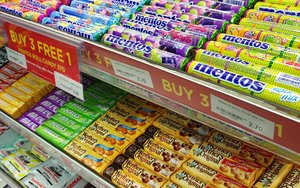
It’s no secret that, despite changing attitudes and habits, Americans as a group still consume substantial amounts of foods and beverages with high calories and high sugar and/or fat
content.
However, according to one new survey, most claim that they want support for healthier purchasing and eating habits in the form of seeing fewer unhealthy choices and
more healthy choices in food and nonfood stores, and at checkouts in particular.
In early December, nonprofit nutrition advocate the Center for Science in the Public Interest--an
aggressive opponent of "junk food" and sugary beverages--commissioned Caravan ORC International to conduct a multiple choice-questions survey among a representative sample of U.S. consumers (1,024
respondents).
advertisement
advertisement
Nearly three-quarters of respondents said that they consider “unhealthy” foods and soda in supermarkets and convenience stores to be a
“substantial” (31%) or “moderate” (42%) problem. Twenty-one percent and 5%, respectively, said that this is “not really a problem” or “not a problem at
all.”
The numbers were very similar when asked about unhealthy offerings in other types of retail formats, like drug stores and toy stores. In addition, 27% and 45%,
respectively, said that unhealthy items on restaurant menus are a substantial or moderate problem.
Similarly, 78% agreed strongly (35%) or somewhat (43%) that checkouts at grocery,
hardware, office supply and other stores are stocked with “a lot of foods and beverages I don’t want.”
Sixty-seven percent agreed strongly (31%) or somewhat
(36%) that they would “prefer not to have soda, candy, chips and other high-fat, high-sugar foods at checkouts at grocery stores.” Again, the numbers were virtually the same when asked
about non-food stores. Seventy-four percent and 79%, respectively, said that they would prefer to see candy and soda located in the “regular aisle” for those products.
Conversely, one-third (35%) strongly agreed and 45% somewhat agreed that they would prefer it if food and non-food stores offered more healthy choices at checkouts.
Check-out Buying Habits
Half (51%) admitted that they’d purchased candy, chips, soda or other snack food or sugary drinks at checkout in the previous month,
and 76% said they felt regret after buying such items at checkout.
People with a household income under $35,000 a year (62%) were more likely to report that they made an unhealthy
purchase from checkout once a month or more than people with incomes above $50,000 a year.
Attitudes Toward Food Makers, Retailers
Three-quarters of
respondents agreed that it’s hard for parents to shop with children at grocery stores because “there’s so much junk food,” and 86% agreed that characters on food packages, toys
that come in cereals, candy at checkout, and other in-store marketing result in conflict between parents and children.
Nearly half (48%) said that in general, marketing and
advertising of “junk food” aimed at kids is a substantial problem, and 35% a moderate problem.
Asked if they think it’s true that food and beverage manufacturers
“pay supermarkets substantial amounts of money each year to place their products at eye level, in prominent positions, on end-of-aisle special displays and at checkout,” 85% said that they
think that that statement is true.
That was followed with a question saying “That statement is, in fact, true. Does this fact make you more or less likely to trust the
following?” Half (49%) said it makes them “neither more nor less likely” to trust food companies, versus 38% and 13% saying it makes them less likely or more likely, respectively, to
trust food companies.
That may be because these practices weren’t surprising to respondents: Half also said that they think that “supermarkets put the interests of food
manufacturers before the interests of shoppers.”
Similarly, 51% said it doesn’t influence their trust in supermarkets one way or the other, versus 34% saying it makes
them less likely and 15% saying it makes them more likely to trust supermarkets.
More than half (56%) said that their impression of a store “that has candy, soda or other
high-fat, high-sugar food at checkout” would be “neither favorable or unfavorable,” and 22% said their impression would be very favorable (11%) or somewhat favorable (11%). Just 14%
and 7% said that their impression would be somewhat or very unfavorable, respectively.
The largest percentage (77%) indicated that getting through checkout quickly is a high
consideration in choosing a checkout line, while just 18% said that picking a line with no unhealthy items displayed is a high priority (32% and 50% ranked that a medium or low priority,
respectively).
At the same time, asked how their impression would be affected if a grocery or other store carried only “healthier” foods at checkout, 36% said it would
improve slightly, and 26% said it would improve substantially, while 28% said it wouldn’t change.
Also, 79% agreed that supermarkets “should do more to make it easier
for people to eat healthfully.”
What types of healthier food or non-food options would they buy if offered at checkouts? The most-chosen items among those offered were nuts (36%),
batteries (31%); lip balm, shampoo or other personal care products (29%); water/seltzer or fresh fruit (each 28%); granola bars (27%), hand sanitizers (25%); travel-size OTC medications (24%); dried
fruit (21%) and magazines (20%).